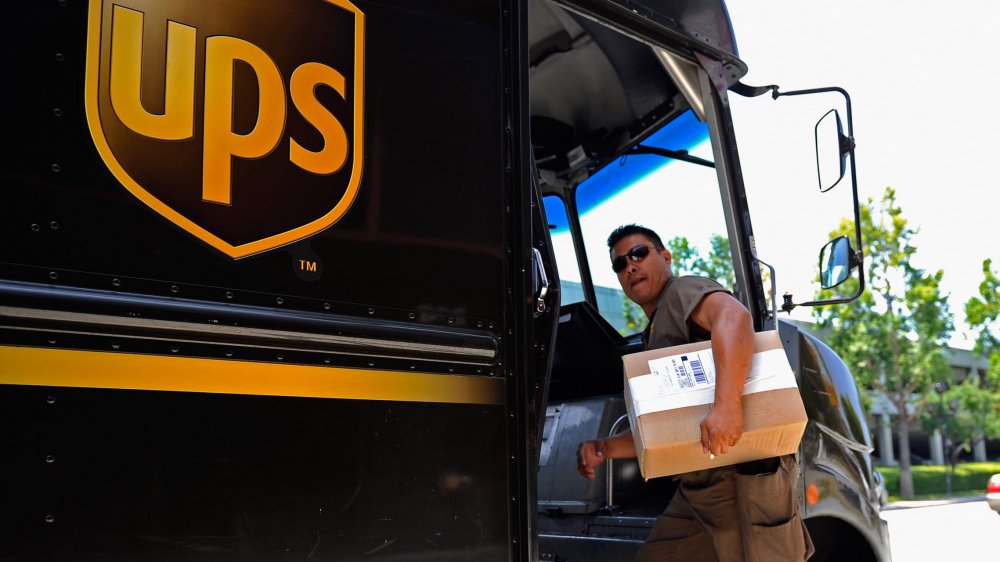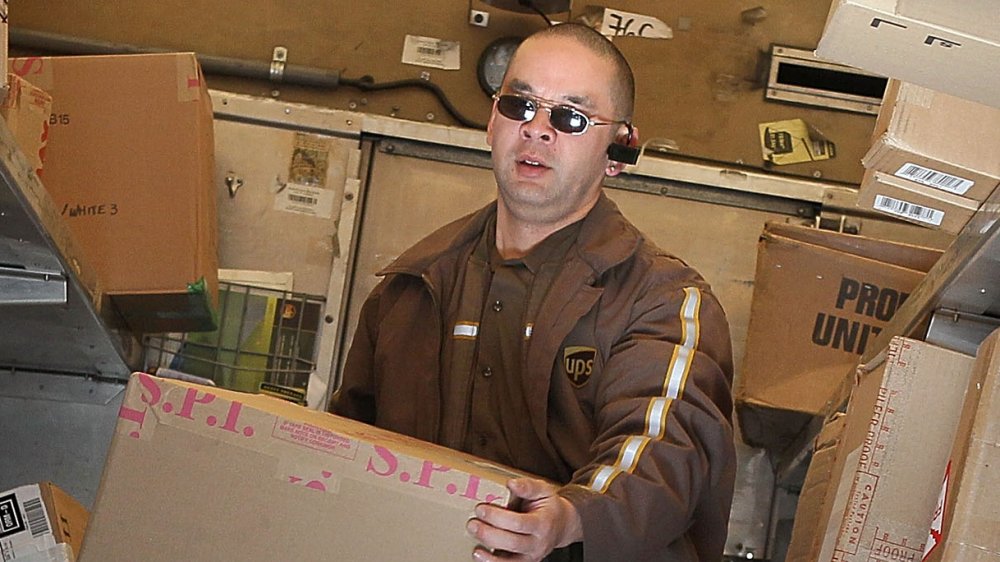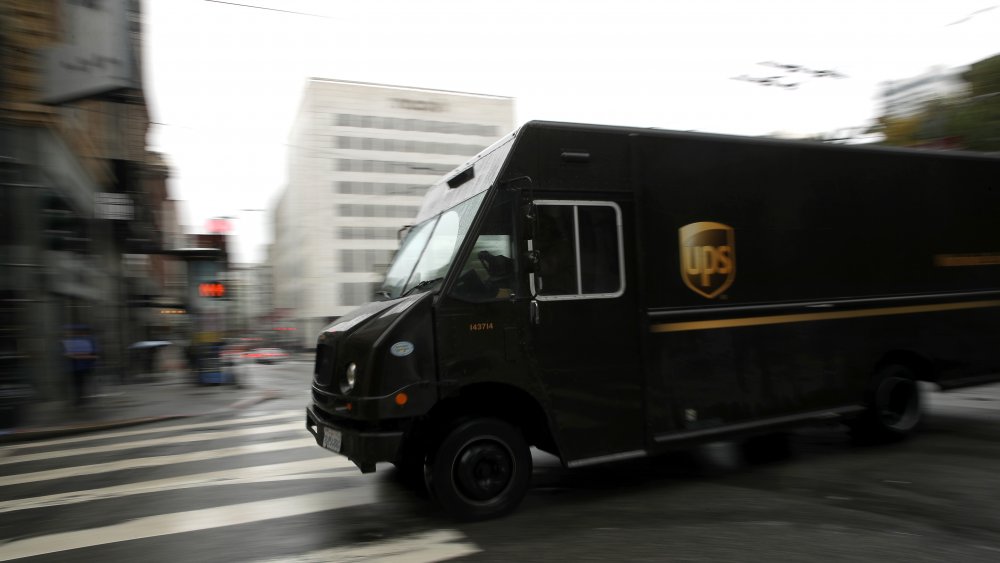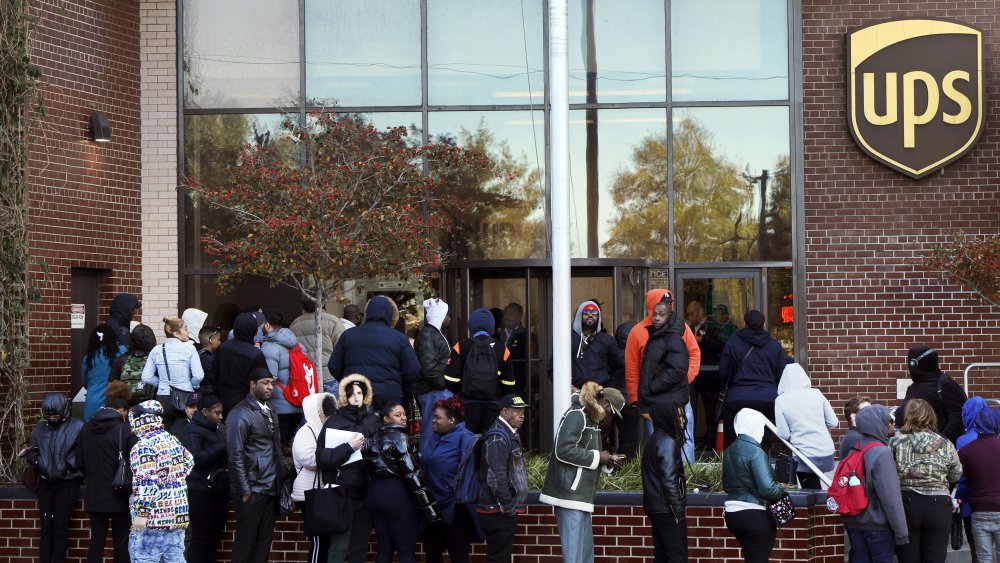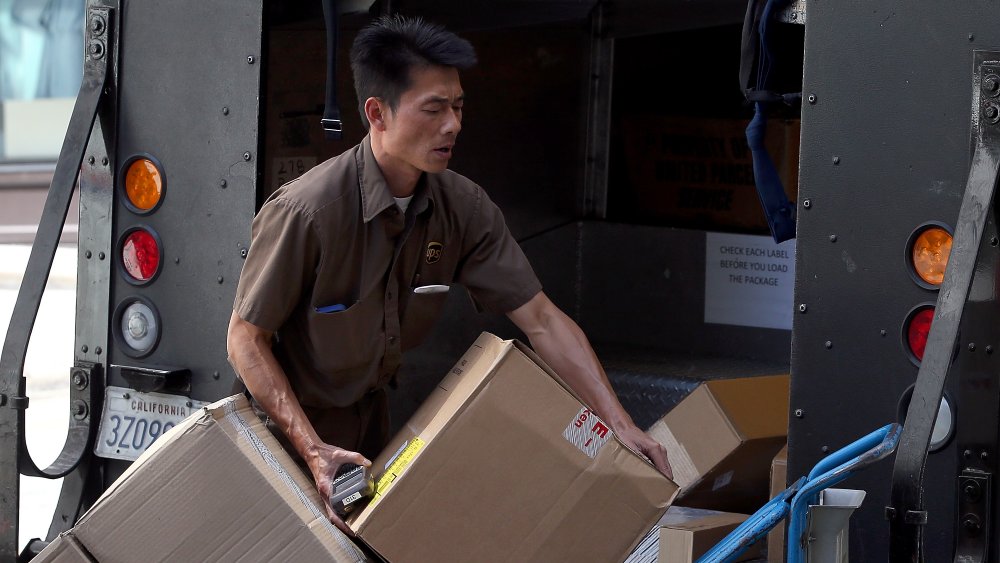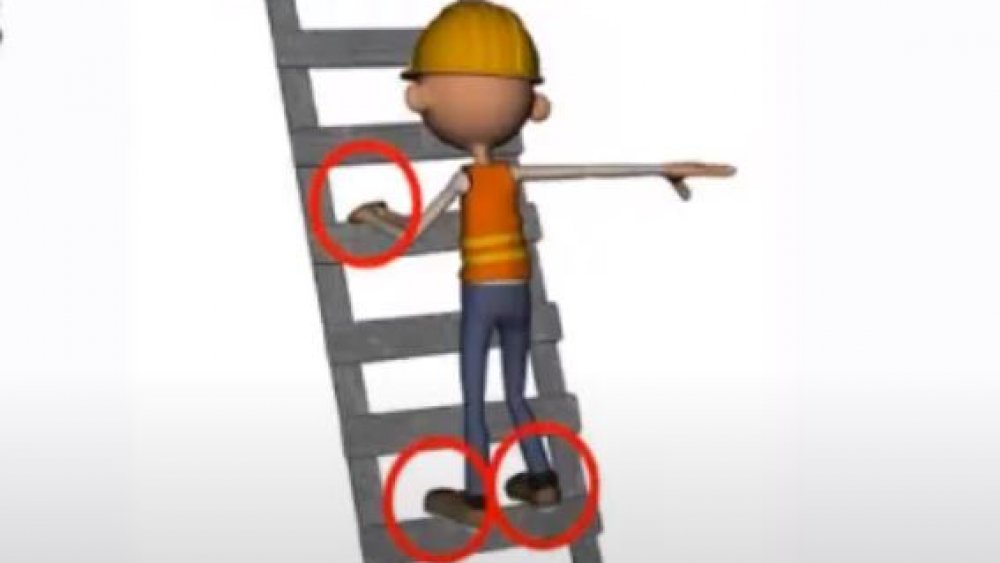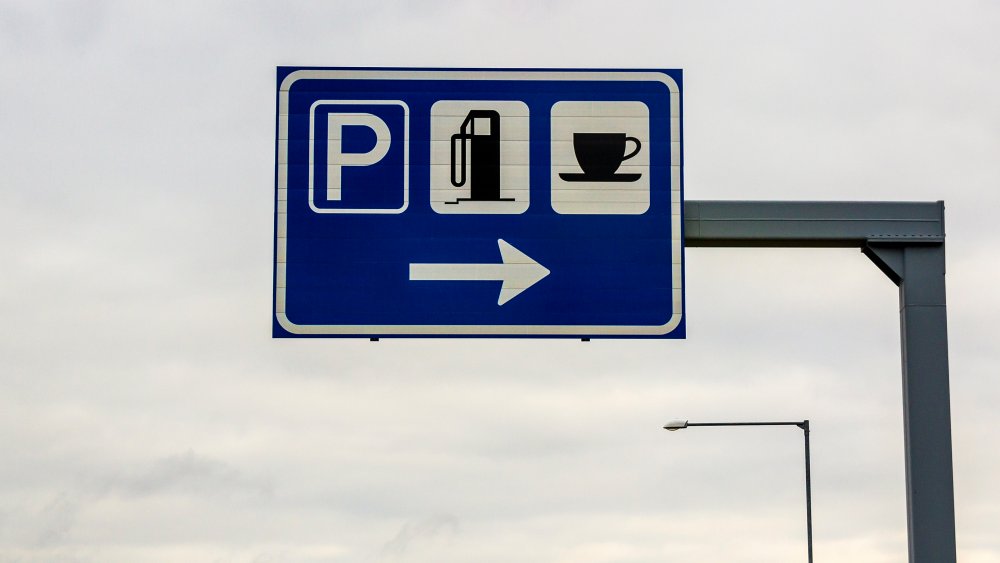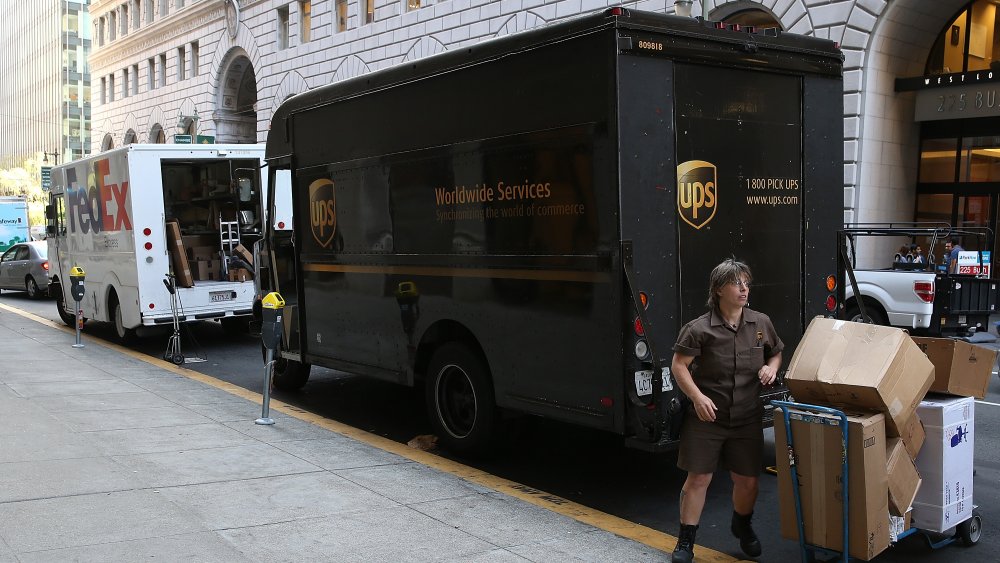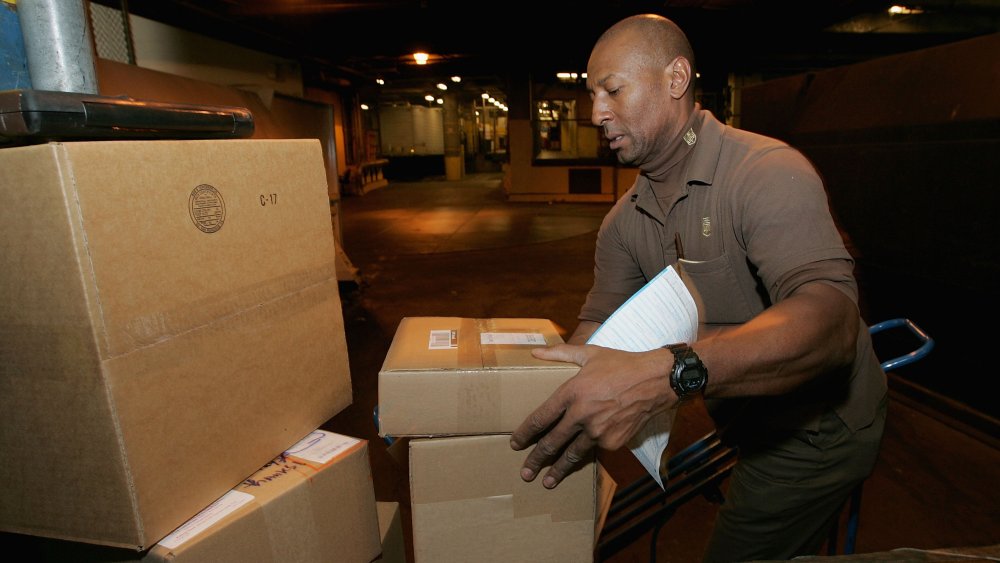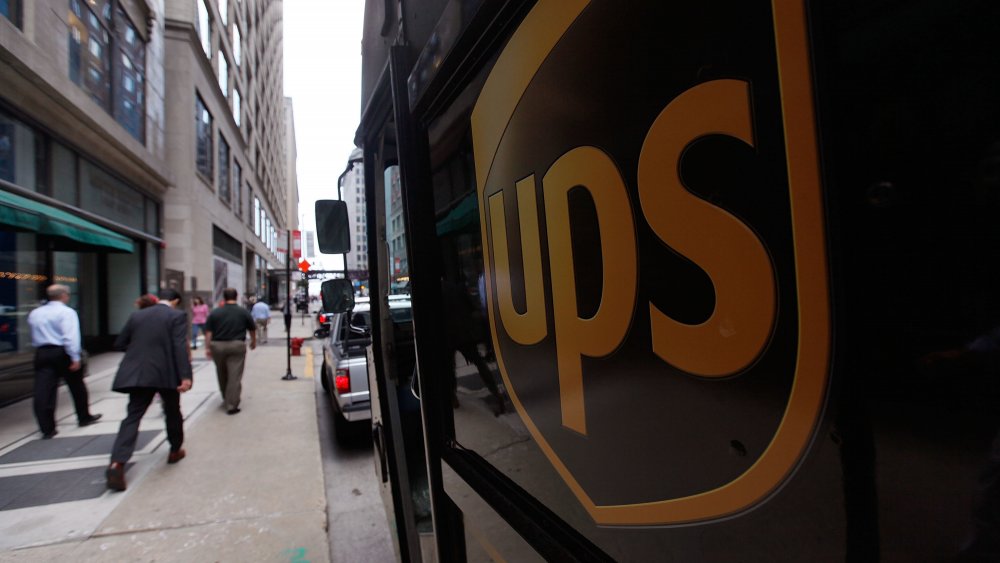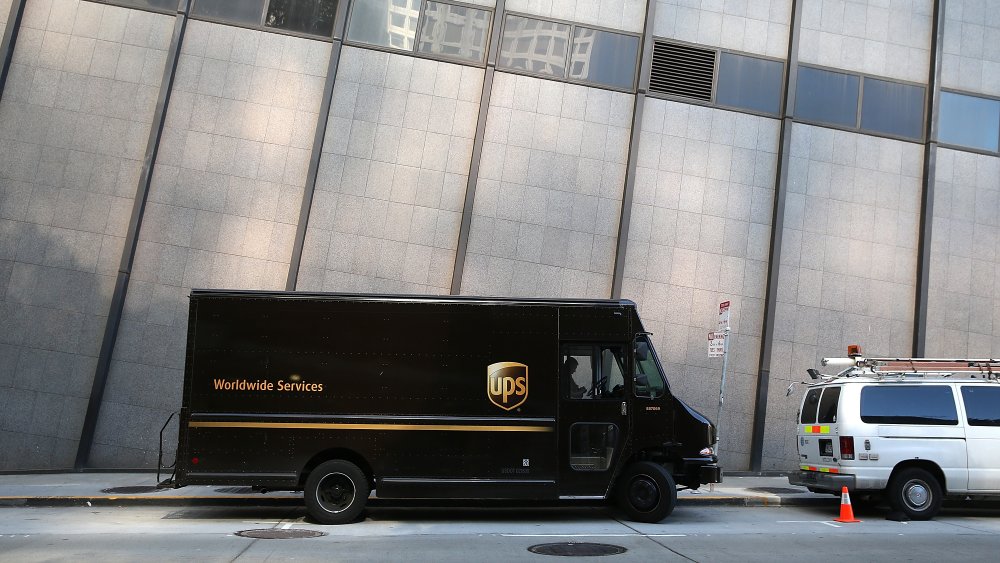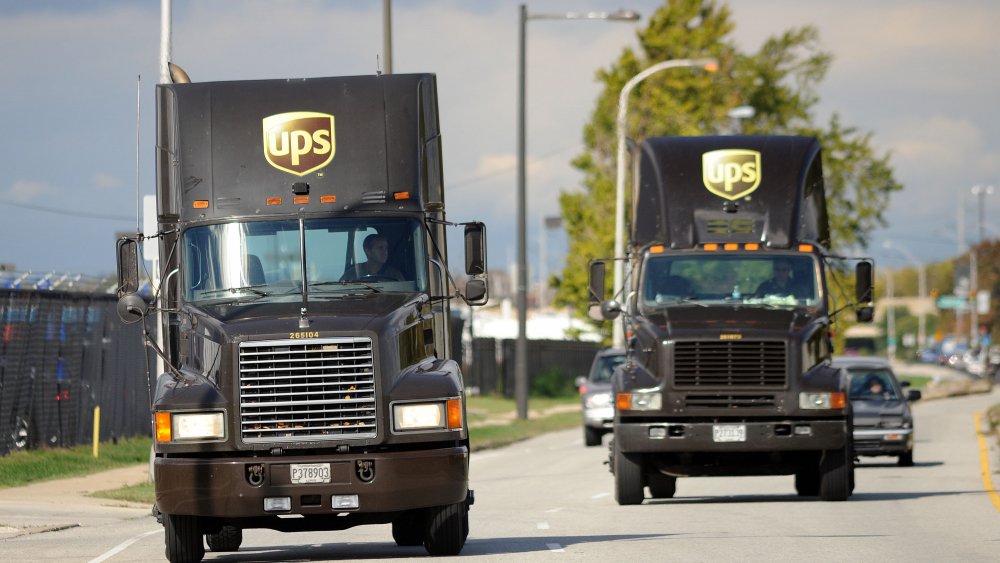Strict Rules All UPS Truck Drivers Have To Follow
You'd think that being a UPS driver might be a pretty chill gig. Obviously, it's hard work, and sure, those long hours around the holidays seem like a definite drag, but overall, the rules can't be that strict, right?
Guess again. Have you ever wondered why your friendly neighborhood UPS driver is in such a mad rush to drop your package off and speed away like a bat out of hell? It's not them. It's the fact that they're on a crazy schedule, on a crazy route, where they have to follow a seemingly infinite number of rules and tactics referred to by the powers-that-be as the fabled "340 methods." Most of these rules are about achieving a godly level of efficiency, while some of them are just bizarre, but none of them are fun. UPS has faced a number of problematic lawsuits regarding how far they want to push their workers, and in what ways. Do these rules make sense? Are they too strict? Decide for yourself, but here are some of the requirements that your local UPS driver has to keep in mind every time they climb into their vehicle.
No beards for you, says UPS
If you haven't noticed, facial hair is in. As the 2010s have turned into the 2020s, it's clear that men with beards are here to stay, as they now appear everywhere from corporate boardrooms to your favorite hipster coffee shop. As the clean-shaven norms of the past have been done away with, most companies have relaxed their draconian rules regarding beards ... which is a good thing, fashion trends aside, because as Vox points out, workplace bans on facial hair carry a disturbingly racist undercurrent.
Guess which company that hasn't moved on from their rose-colored vision of the past? Yep, UPS.
To this day, the package delivery company enforces a strict moratorium on male drivers possessing beards and/or long hair. According to a spokesperson who spoke to the BBC, "UPS prefers that its drivers, as ambassadors of the company, are clean shaven." Now, on a small scale, this results in situations wherein super-qualified applicants can get rejected for not shaving. On a bigger scale, UPS's beard ban amounts to religious discrimination, as Business Insider reports, since employees who wear beards for religious reasons are pressured to conform to the Ward Cleaver standard. In 2018, UPS had to cough up $4.9 million over these religious discrimination charges, which you'd think would be enough motivation to finally update this policy, but absurdly enough, UPS is still crabby about facial hair, much like that corny old boss you suffered through during your first high school job.
UPS drivers (usually) never turn left
You read that correctly. UPS drivers are not supposed to take left turns, if they can help it, and their routes are actually strictly planned to minimize the necessity of such turns as much as possible. The reasoning behind this seemingly bizarre rule, as explained by the Independent, is efficiency. When you take a left turn, you have to move through oncoming traffic, which means that even though a left turn might be a shorter distance, it will lead to a longer drive. UPS boasts that avoiding such turns reduces delays from waiting for traffic to clear, leads to 10 million fewer gallons of fuel being used a year, lowers carbon dioxide emissions, delivers 350,000 more packages, and perhaps most importantly, reduces the number of traffic accidents. Frankly, the figures here are surprisingly convincing — and were tested by Mythbusters, if you're curious — to the point where one could make a decent argument that maybe everybody should avoid these turns, just like UPS drivers do.
Now, to be clear, sometimes a UPS driver just has to take a left turn, and there's no getting around it. This doesn't happen too often, though, as UPS claims only about 10 percent of the turns on their maps are left-handed ones. On the same note, this whole paradigm is reversed for countries with right-hand traffic: it's not about which side you're on, it's about not going against the other cars. Got it?
Take your classes, young UPS padawan
Driving for UPS isn't a simple, easy job. If anything, even the most passionate UPS driver in the world would tell you it's a crazily complex career that requires you to learn the full "340 methods," as Fortune explains. That also means, naturally, that UPS driving isn't a job where you just fill out an application, smile big at the manager, watch silly PowerPoint presentations, and receive the keys. Nah, you basically have to go through UPS bootcamp, as Business Insider points out, or as the big dogs call it, Integrad. Once you've finished some online coursework, you're sent to one of UPS's training facilities, and depending on what position you're gunning for, these hardcore classes last for anywhere from five to nine days.
What do they teach? Hazard avoidance and management, of course. New workers are trained to be the safest drivers on the road. Efficiency rules are etched into everyone's brains. Trainees learn how to load trucks the fastest way possible, and most amusingly, have to run through a "slip-and-fall" course where they learn how to move quickly across ice without falling on their face. If you're imagining that this particularly course is hilarious to watch ... well, it's probably even funnier than you're thinking, since UPS sometimes brings in live penguins, to demonstrate some seriously skilled ice-walking.
Anyhow, the point is, every UPS driver you've met has been through some mad serious training at Integrad, so they definitely know their stuff.
UPS drivers aren't allowed to waste UPS's time
There's probably been a time, at least once in your life, where a UPS driver hurt your feelings. Sure, they smile all big when they first see you, but it can seem insanely rude when this smile is followed by them chucking a package at you from about 20 feet away, leaping back into their truck with a well-practiced twirl, and then slamming on the gas as they race over the horizon. Seriously, are these guys trying to act like the Joker, or what?
Don't blame the drivers. It's not their fault. They're just operating on a ridiculously tight schedule, with an insane number of deliveries ahead of them, and it's been drilled into their heads how much every single second counts. To enforce this doctrine of efficiency, UPS drivers have to be tracked — yes, tracked — throughout every moment of their shift, on the world's most anal timer, or Big Brother will have a problem with it. UPS trucks are "rolling computers," as NPR points out, and every stop of a driver's day is intensely analyzed by the company, so the higher-ups can figure out how to cut down on extra time, and fit in more deliveries. That's not creepy or anything, right? Nah.
You know that feeling you get, when you open your phone, see 35+ unread emails, and one of them is your manager saying you're taking too long to reply? That's a UPS driver's workday, but on wheels.
UPS drivers always get in and out of their vehicles in a very exact way
Okay, so if someone were to first tell you that UPS drivers have to follow strict rules as far as how they climb in and out of their vehicles, you'd probably think it was insane. Unlike some of UPS's other "methods," though, their requirement for drivers to follow the "three points of contact" routine, as noted by the Chicago Tribune, is actually a good safety measure.
What this means in practice, as Fortune outlines, is that when a driver gets in or out of their truck, they should have one hand on the handrail, one foot on the step, and another foot on the ground below — three points, see? — every single time, without fail. Doing this consistently reduces stress on the ankles. Keep in mind, UPS drivers have to do this hundreds upon hundreds of times a day, and using improper posture could do a surprising amount of damage: what might sound like perfectionism gone awry is, in actuality, practical advice. In general, using the three points of contact is the safest way to enter or exit trucks, as AF Group reports, and the multiple anchor points inherent to this method lowers the impact of injuries caused by slips and falls. Consider: if you have one foot on icy ground, and it slips, your hands on the handrail will catch you, as will your foot on the non-slippery step.
UPS drivers need to plan their bathroom breaks
UPS drivers operate on some crazy strict time limits, and that means it can be really difficult to find the time to do essential human tasks like ... you know, taking a pee. According to Thrillist, it's generally recommended for UPS drivers to plan their bathroom breaks, instead of taking them in some impromptu fashion, lest they fall behind: For example, if you've got to load up on gas anyway, that's a great time to take a whiz. If the tracking software shows drivers taking too long, as the Nation reports, they will be accused of "stealing time," as well as messing up their SPORH count (Stops Per On-Road Hour), and explanations will be demanded. Bladder justifications probably don't make for fun conversations.
Because of these authoritarian potty demands, at least one driver told the Tampa Bay Times that he and others frequently just urinate in the truck, using cups, bottles, and so on. When asked about this claim, of course, UPS denies it.
Don't ever call a UPS truck anything but a 'package car'
When you think of UPS, the first image that pops to mind is probably a big brown truck. However, if you work for UPS, you better not call it a truck. For those on the inside, as Fortune explains, these boxy vehicles are strictly referred to as "package cars."
Now, to be fair, it's highly unlikely that if and/or when a driver accidentally calls his vehicle a "truck," particularly to a non-UPS person, that they'll come back to find themselves fired, punished, or dropped through a trapdoor and electrocuted. However, UPS takes their package cars quite seriously, and they are also quite serious about calling them package cars, as seen in their promotional materials highlighting the evolution of the vehicle over the past century. Of all the vehicles highlighted, only their dreamy future one gets the honor of being called a "truck," and that'll probably change when the future becomes the present.
On that note? If you've ever imagined that one day you might own a package car of your very own, forget it. As explained by Jalopnik, UPS takes intensive care to make sure that nobody gets a retired vehicle, as most of them are turned into scrap metal once the company has finished using them.
The ring finger rule? It's gone, baby, gone
Not too long ago, UPS strictly required all drivers to carry the car keys on their ring finger, according to an archived piece from the Wall Street Journal. Super weird, right? You can probably guess the reasoning: Unlike you, who spends 20 minutes searching for your keys every time you leave the house, UPS didn't want their drivers to waste any time with such nonsense. Thus, if the keys are always on the ring fingers, the keys never get lost. Bam. This rule, as Fortune described it, also enabled drivers to position the key with their index finger, put the car in ignition, and pull it out in one swift motion.
These days, though? The ring finger rule is gone. It's not that UPS got more lax about it, but rather, that technology evolved, and they realized it sped up the process even further if the regular keys were replaced with fancy-schmancy key fobs. As explained in a management textbook by Chuck Williams, the switch to fobs saves UPS two seconds per delivery, for a grand total of six minutes a day. Yes, when UPS chief operating officer David Abney says, "We're obsessive about efficiency," he sure isn't kidding.
Another plus to fobs? UPS drivers now snap them to their belts, so they never get lost (ideally).
UPS has strict rules about pens, of all things
When UPS boasts about their 340 methods, it applies to a lot of details that you might think are mundane. Every single one of these methods has been studied for decades, tested, and proven to shave seconds off of every delivery, to ensure that the company can squeeze out as many deliveries as humanly possible. One of these methods, indeed, is all about where the driver keeps their pen.
This tiny detail, according to NPR, is simple enough: If you're a driver, you must keep your pen in your pocket. Which one? Depends on hand dominance, of course. Left-handed drivers must keep their pen in their right pocket, and right-handed ones need to use the left pocket. That's front pockets only, by the way, according to Dan Honig. While taken on its own, this rule would seem ridiculously fussy, the fact that it functions alongside hundreds of similar such policies points toward the ethic of UPS, as a whole, which is a company that prizes efficiency above all else ... while not being so worried about remembering that their workers are human beings.
UPS drivers must try not to back up
Has your local UPS driver ever gotten frustrated about how narrow your driveway is, or the fact that there are so many cars parked in it that they have to — god forbid! — switch into reverse from a little bit, in order to get out?
Again, don't blame the driver. This is a matter of UPS policy, which discourages drivers from backing up as much as possible. A little backing up is bad enough, and long back ups are especially frowned upon, according to drivers posting their own experiences on the Brown Cafe message board. The reason for this anti-back up agenda, according to NPR, is safety-related. As you've probably noticed, whether from the time your parent backed up into the mailbox, or the time you backed up into your favorite tree, reversing a vehicle often causes accidents. And lest you think that you can convince your UPS driver to back up on your driveway via your unbeatable charm, think again. Since the driver's vehicle tracks their every move, their superiors will come down hard on them anytime the computer records them as going into reverse.
As explained by a truck driver interviewed by NPR, "They know exactly how many times you back up and where you're backing up. And they also know the distance. They know how far you're backing and the speed that you're backing at."
UPS drivers are limited to 60 hours a week
Most of the stricter UPS rules come straight from UPS. At least one rule, though, comes from higher up on the food chain — and it's actually a good rule, which UPS has previously tried to flout.
Who could be more powerful than UPS, you ask? The United States Department of Transportation, who strictly forbids commercial drivers from working more than 60-hour weeks, for safety reasons that should be blatantly obvious. Now, this 60-hour max does result in some hiccups, as the Denver Post writes, such as package delays, since a driver has to come back to the hub if he hits the big 60, undelivered parcels be damned. Better late than dead, though, right? However, in late 2017, KATU News reported that UPS was responding to the surge in holiday package deliveries by pushing drivers to work 70-hour weeks, which is ... well, insane.
Thankfully, the UPS delivery driver unions took legal action against the company. According to Labor Notes, unions in New England rallied in the parking lot, as hundreds of drivers refused to start their trucks, demanding that if the company didn't value their lives, they weren't going to value their requirements. When managers protested, the workers stood their ground. The solidarity of the New England drivers won against UPS, and these drivers got to keep the 60 hour weeks they wanted, instead of kowtowing to the forced overtime that had previously been demanded from them.
